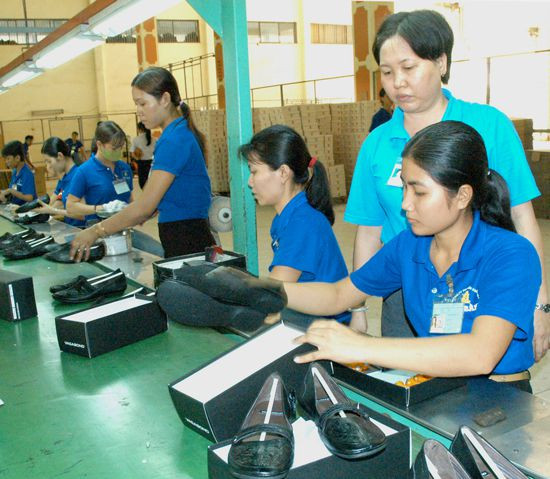Legalization of anti-dumping tax, anti-subsidy tax, and self-defense tax
On the morning of October 21, the Report on the draft Law on Export Tax and Import Tax (amended) was presented by Minister of Finance Dinh Tien Dung, authorized by the Prime Minister, at the National Assembly session.
Accordingly, the draft Law on Export Tax and Import Tax (amended) consists of 22 Articles, organized into 5 Chapters, including: General provisions; Tax basis, time of tax calculation and tax schedule; Anti-dumping tax, anti-subsidy tax, self-defense tax; Tax exemption, tax reduction, tax refund and Implementation provisions.
The Minister of Finance stated that one of the main amendments to the draft Law is a group of issues on encouraging the development and reasonable protection of domestic production and business in accordance with the development orientation of the Party and the State and the signed international commitments. At the same time, some provisions on anti-dumping tax, anti-subsidy tax, and self-defense tax are added to contribute to protecting domestic production in the context of international integration on the basis of inheriting and upgrading some provisions of related Ordinances. Chapter III of the draft Law (amended) is supplemented, stipulating the conditions, principles, competence and time limit for applying anti-dumping tax, anti-subsidy tax, and self-defense tax on the basis of inheriting the provisions of the 3 current Ordinances.
In addition, to ensure that there is sufficient legal basis to apply new tax measures that may be necessary to handle arising cases such as the application of retaliatory taxes allowed to be applied within the framework of the dispute settlement mechanism of the World Trade Organization (WTO) and bilateral and regional trade agreements that Vietnam has participated in, Clause 5, Article 15 of the draft Law adds the provision: "In case Vietnam's interests under international treaties are infringed or violated, the Government shall report to the National Assembly to decide to apply other appropriate defensive tax measures", said the Minister of Finance.
 |
| Vietnam will amend and supplement the Law on Import and Export Tax to comply with international economic integration. (Photo: CAO THANG) |
Amendments to the principles, authority to issue the Tariff, tax rates and authority to issue the Export Tax Framework are also other noteworthy contents in the draft. Regarding the authority to issue the Tariff, the draft Law stipulates:
The Prime Minister shall, based on the provisions of Article 10 of this Law, the Export Tariff according to the List of taxable commodity groups and the export tax rate framework for each commodity group issued together with this Law; the preferential tariff schedule committed in the WTO Accession Protocol ratified by the National Assembly and other international treaties, promulgate: a) Export Tariff; Preferential Export Tariff; b) Preferential Import Tariff; Special Preferential Import Tariff; c) List of goods and absolute tax rates, mixed tax, and import tax outside the tariff quota.
Through the preliminary review of the draft Law, Chairman of the Finance and Budget Committee Phung Quoc Hien stated that the amendment of the Law on Import-Export Tax this time aims to meet the requirements of international economic integration, in accordance with the Trade Agreements on tariffs that Vietnam has signed and is signing, according to which it is expected that within the next 10 years, the level of trade liberalization will reach 97-98% of tax lines. Therefore, the Standing Committee of the Finance and Budget Committee proposed that the Government, in addition to assessing the impact of increasing and decreasing state budget revenue in amending the Law on Import-Export Tax, should also supplement an overall assessment of tax policy and the ability to offset the shortfall in state budget revenue due to amending the Law on Import-Export Tax from other options to ensure that the ratio of tax and fee mobilization on GDP in the coming period is not reduced, contributing to ensuring national financial security.
Regarding the authority to promulgate tax schedules and tax rates, the majority of opinions in the Standing Committee of the appraisal agency agreed with the Government's Submission on the authority of the National Assembly Standing Committee to promulgate minimum tax rates for each sub-group of goods in the list of groups of goods subject to export tax (mainly resources and minerals) and assign the authority to the Prime Minister to prescribe as in the draft Law. However, to ensure the authority of the National Assembly according to the provisions of the 2013 Constitution, it is recommended to clarify the remaining tax lines on imported goods that Vietnam has not signed and which agency has the authority to decide on tax rates in the tax schedule; supplement regulations on the authority of the National Assembly in ratifying Tariff Agreements negotiated and signed by the Government.
Mr. Phung Quoc Hien also clarified that some opinions in the Standing Committee of the Finance and Budget Committee said that, according to the provisions of the 2013 Constitution, the National Assembly has the authority to decide on taxes. Therefore, the provisions as in the draft Law are not consistent with the provisions of the 2013 Constitution. This type of opinion suggests clearly stipulating in the draft Law the List of goods and tariff schedules of exported and imported goods that Vietnam has not signed with countries and international organizations. For some goods that need to be adjusted and changed regularly according to the requirements of economic management in practice, the National Assembly assigned the Standing Committee of the National Assembly to decide.
According to SGGP Online
| RELATED NEWS |
|---|

